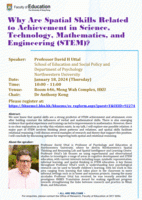ICAP: A Theory of How Students Engage to Learn
Lecture
Date
December 07, 2023 (Thu)
Venue
Time
5:00 PM - 6:25 PM
Materials/Resources
Speaker

ICAP: A Theory of How Students Engage to Learn
Professor Michelene Chi
Regents Professor & Dorothy Bray Endowed Professor of Science and Teaching
Mary Lou Fulton Teachers College
Arizona State University
Date: December 7, 2023 (Thursday)
Time: 5:00 pm - 6:25 pm
Venue: Rayson Huang Theatre, HKU
Language: English
Registration: Closed
(Seats are available on a first come, first served basis.)
ICAP is an evidence-based theory that distinguishes four overt physical ways that students can engage with instructional inputs (e.g., taking notes). These four physical ways of engaging are: Interactive (collaborating), Constructive (generating), Active (manipulating), and Passive (attending). These four different overt ways may correspond to undertaking four different sets of covert thinking processes, thereby resulting in decreasing levels of learning: That is, I>C>A>P. Hundreds of existing studies support the learning outcomes predicted by ICAP. ICAP can be used to guide pedagogy in terms of identifying and evaluating the engagement modes of various instructional activities for students. Many other applications of ICAP will also be presented.
About the Speaker
Michelene T. H. Chi is a professor at Arizona State University’s Mary Lou Fulton Teachers College, and she also serves as director of the Learning and Cognition Lab at ASU. She is a cognitive science researcher with a focus on how students learn. Her seminal ICAP framework defines active learning by differentiating students’ learning activities as passive, active, constructive or interactive, and it compares their relative effectiveness. Her earlier research investigated the role of knowledge in children’s competence as well as in differences in the representations between adult novices and experts. She discovered an important phenomenon that self-explaining increases learning more than receiving explanations, and pioneered a method of analyzing verbal explanations that is both quantitative and qualitative. She has done seminal studies on many other learning methods, including learning from being tutored, from collaborating, and from observing and overhearing tutorial dialogues.
Professor Chi is a member of the American Academy of Arts and Sciences and the National Academy of Education, and the recipient of numerous recognitions and lifetime achievement awards in both psychology and education, including the 2023 Yidan Prize for Education Research.
All are welcome!
Enquiries:[javascript protected email address]



